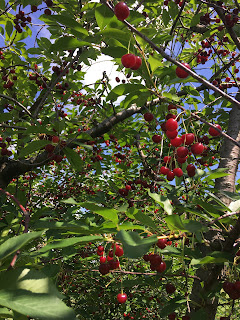When we walk we are often torn between having a deep discussion about something that is on our minds or being quiet so that we can better take in our surroundings. Today felt like a day for silence to me. The beauty of the sky and the fields, the trees in their full summer greenery and the occasional bird flitting by demanded all of my attention.
After we had walked for a while, we came to a stream which had hardly any water. It was unusual to see it so dry, and Gary commented on the news he had read. "Some of the major rivers in Europe are drying up, and out in the Western US they are talking about diverting the Mississippi river to supply water to the drought-stricken Southwest."
I didn't really want to talk about it. Honestly, I didn't want to think about it either. I couldn't help remembering Mary Evelyn Tucker's comment nearly 20 years ago now at a Yale symposium I attended on climate change and the church. She said something to the effect that, if we didn't preach about climate change and encourage our churches to do something make a difference now, then we would be forced to talk about it soon enough because the results of it would become evident and catastrophic.
Well, things do feel pretty catastrophic, and despite the beauty of my surroundings, anxiety zips through my mind. I know there are many small things I can do to help ease the situation, and I do as many of them as I can manage. But I also know that real change will only happen when good, environmentally responsible decisions are made at the national and international levels.
This means we need leaders who understand the issues and are willing to do what is right, despite the political fallout. This means helping our leaders find their way back to values like honesty, integrity and working for the good of all people and all inhabitants of the earth. It can be discouraging, to see how wealthy businesses and individuals continue to pursue financial gain rather than looking to do what is right for the whole.
People ask me, "How can we deal with the frustration? How are we supposed to handle the anxiety and the stress all of this brings to our lives?" For me the answer lies in spending time in the natural world every day, even if I am just sitting on my porch for a little while. It means breathing in the air and paying attention to whatever is there - birds flying across my line of vision or a bee buzzing around my lunch, a lush garden of flowers or weeds poking up out of the sidewalk, clouds rolling up from the distant hills or a a trickling stream, my cat pushing at my hand for attention.
Breathing in, I take in the freshness, the reality of this moment in time. Breathing out, I release the things that trouble me. I do this as long as it takes, until I feel a bit calmer, a little more prepared for my day. And then I stand up and put my hands and my heart toward whatever is next, whatever is needed of me.






